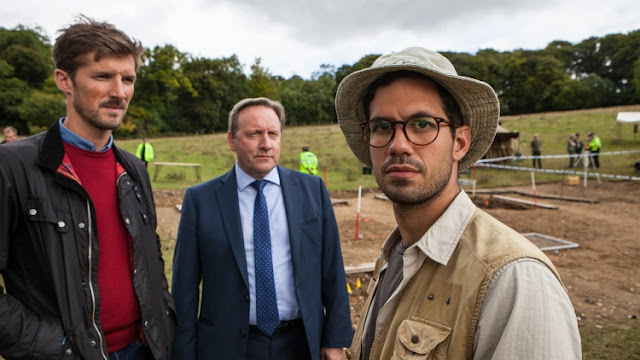A Dying Art
Episodes
of Midsomer Murders that possessed a macabre turn were becoming less
prevalent by 2016 however `A Dying Art` was a definite throwback to those
earlier times. The setting of a sculpture park gave director Matt Carter ample
opportunity to relish unusual shots around these bizarre modern art
installations dotted about a forest. The first murder is particularly well
staged with the haunted face of the park’s owner Brandon Monkford appearing
through a haze of gold liquid. Later on someone will be pummelled by a very
large metal ball and another unfortunate victim will perish and then be propped
up alongside a line of coloured dummies.
We are in the orbit of another very rich and disturbed family of the
sort that seem to make a habit of moving to Midsomer to be murdered. The
Monkfords have enemies aplenty and as Jeff Povey’s script unfurls he manages to
frustrate our guessing game by killing off each new suspect!
The
episode benefits from a strong cast including a returning David Bamber (who
only has to walk through a door to look suspicious!), Cherie Lunghi as the
slightly underused widow of Monkford, Adrian Scarborough as the gardener Tony
Pitt who to the family’s surprise ends up inheriting the whole estate and is
wonderfully short with everyone as soon as he does. There also a very shifty
looking Ramon Tikaram as a rakish artist and a superbly understated Saskia
Reeves as Pitt’s wife. Carter’s direction and Povey’s lively script make the ninety
minutes rush by with each murder and development set up really well. While
there are many echoes of other episodes I suppose at this stage (this was
season 18) that is inevitable but the skill is in the way it is assembled.
Sometimes
tv drama of this sort can keen to close to formula whereas this episode, which
on paper may seem to do that, in realisation comes alive. There is a real scary
quality to the murders which are treated with more seriousness than the series
sometimes did. There’s a sense of real
anger amongst the villagers and real strife amongst the families. The final
stand off in an old barn is particularly well choreographed passing that test
of remaining interesting even when we know who the murderer is. On the negative
side there is a little too much coincidence in some of the interconnected
relationships but then it is a village!
Saints and Sinners
Midsomer
villages often seem to have a singular tradition celebrated by way of a
festival of some kind and these are unique to that particular village. By the
series’ bizarre standards Midsomer Cicely’s eponymous Cicely Day is a fairly
ordinary religious based affair built around a local Saint but it causes quite
a bit of trouble in this episode. Lisa Holdsworth’s story sees the tradition
threatened when an already unwelcome archeological dig reckons to have
discovered the bones of Cicely – bones already supposedly buried in the crypt
of the village church. If the idea of murders being committed over old bones
and a Saint sound far fetched then remember the series we’re in!
Saint
Cicely Milson is the cause of much devotion amongst the villagers- an early
scene shows them rebuffing the offer of free champagne for all as the diggers-
led by abrasive Zoe Dyer- celebrate their find. So tensions are running high
and later that night Zoe is buried on her own dig site. There’s a wide list of
suspects amongst which is her estranged husband, professional rivals, supposed
`Nighthawks` who pilfer old relics and of course the villagers themselves.
Her
husband is soon in the clear only because he is crushed by a large tombstone
and the next chief suspect, Reverend Peter Corby (an excellent, intense Malcolm
Sinclair) falls victim to a vicious attack by a spear. Parallel plots involving
stolen goods and brotherly rivalry serve to distract Barnaby too. The latter
strand is especially well handled with both arguments and performances being believable.
The ultimate reveal is done very well because it appears to show you who the
killer is and then takes a sudden left turn and its someone else you never even
suspected!
The
story can be rather dry and humourless – I’d trade a little of the
archeological accuracy for some more character work. This is true of Barnaby
and Nelson too who both are in info-mode for this story with almost all of
their dialogue being factual meaning there is little in the way of asides
except at the start and end. Meanwhile, Kam
gets to experience what every tv pathologist will eventually share- a brush
with danger. In the event she seems to be able to handle it rather well.


No comments:
Post a Comment